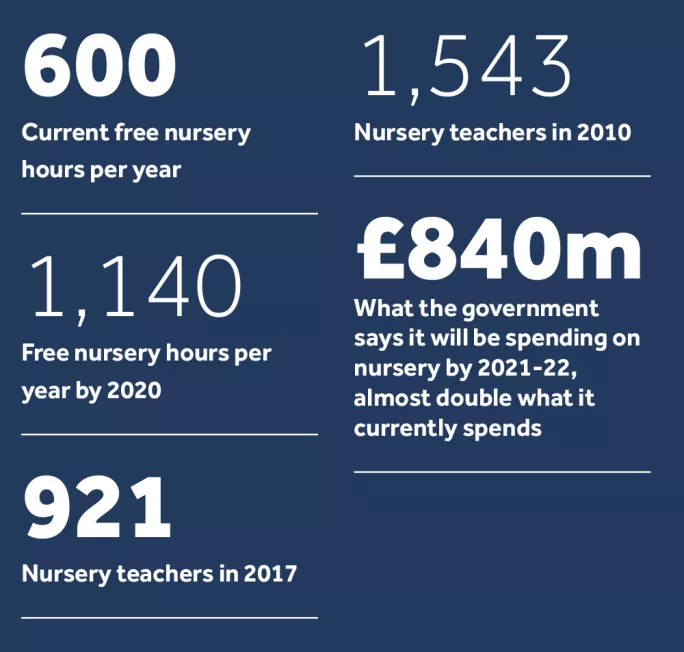
Extra nursery hours may not improve attainment
The government is planning to spend hundreds of millions of pounds to increase free nursery hours, in a bid to improve disadvantaged children’s attainment.
But researchers behind a major study tracking the lives of thousands of Scottish children warn the plan could do exactly the opposite.
The Scottish government is planning to increase free nursery hours to 30 per week during term time - which it estimates will cost £840 million per year by 2021-22. The government often refers to its plans as one of the key planks in its drive to close the attainment gap between rich and poor pupils.
However, research by the longitudinal survey Growing Up in Scotland (GUS) finds that increasing free nursery hours to 1,140 per year is unlikely to improve children’s outcomes by the time they enter school.
The researchers also find, for children from disadvantaged backgrounds, 30 or more hours of nursery per week was associated with “above average levels of hyperactivity difficulties at age 5”.
They warn that, if the expansion of free hours results in a dip in the quality of nursery provision, extra time in pre-school “may well have more detrimental effects”.

The findings come in a report published last month by GUS, which looked at whether there was a relationship between the average number of hours a child attended nursery and five-year-olds’ development using data collected from more than 6,000 children and their families. The children were born between March 2010 and February 2011.
The report says: “The Scottish government has committed to increasing the entitlement to funded ELC to an average of 30 hours per week. The analysis carried out for this report did not find any evidence to suggest that such an increase is likely to have any notable impact on children’s outcomes by the time they enter school, either positive or negative.”
One of the UK’s foremost experts in early years education is now calling on the Scottish government to “pay attention” to research evidence on nursery provision.
Iram Siraj - who has advised the Scottish government in the past and is professor of early childhood education at the University College London’s Institute of Education - believes that increasing free nursery hours to 30 per week across the board will widen the attainment gap.
She says that the latest GUS findings echo those of the 17-year longitudinal survey she co-directed, the Effective Pre-School, Primary and Secondary Education project.
The project found that, when it came to children’s outcomes, half days in nursery were as good as full days, as long as the quality of the nursery was good.
Money where it’s needed
Ultimately, a universal increase in nursery hours would help parents with work and study - but was more likely to widen the attainment gap, says Siraj.
This is because middle-class parents would get their children into the best-quality centres, meaning their development would accelerate more quickly, she adds.
She continues: “If you give something to everyone, the middle-class parents always make more of it.
“You only have to think about what middle-class parents do with schools. It’s exactly the same thing - you will end up with little grammar nurseries in all but name. That’s why you are better off putting the extra money where the need is and improving the quality, graduate training and pay of the workforce.”
Labour’s education spokesman Iain Gray says the government needs to understand that more free nursery places will not “in and of themselves reduce poverty and close the attainment gap”.
He says: “Quality as well as quantity matters when it comes to early years learning. The fact is that under the SNP numbers of specialist nursery teachers have plummeted.”
The teacher census figures published last month show nursery teacher numbers dropped again last year.
EIS general secretary Larry Flanagan says that the union supports the expansion but that the quality of the provision is “paramount”. He calls for learning and teaching in all nurseries to be led by a qualified teacher.
Flanagan says: “All the research evidence shows that access to teacher-led nursery provision provides the strongest basis for addressing the impact of poverty on educational opportunity.”
A Scottish government spokesman says that teachers now form only part of the early years graduate workforce. A much higher proportion of staff have the BA in childhood practice “and the specialist early years expertise and knowledge that comes with this”.
The spokesman adds: “Our expansion of funded early learning and childcare will be truly transformational.
“A range of evidence shows that high-quality early learning and childcare has the potential to improve children’s outcomes and support our efforts to close the poverty-related attainment gap. Some studies show that children from more disadvantaged backgrounds benefit most.”
You need a Tes subscription to read this article
Subscribe now to read this article and get other subscriber-only content:
- Unlimited access to all Tes magazine content
- Exclusive subscriber-only stories
- Award-winning email newsletters
- Unlimited access to all Tes magazine content
- Exclusive subscriber-only stories
- Award-winning email newsletters
You need a subscription to read this article
Subscribe now to read this article and get other subscriber-only content, including:
- Unlimited access to all Tes magazine content
- Exclusive subscriber-only stories
- Award-winning email newsletters
- Unlimited access to all Tes magazine content
- Exclusive subscriber-only stories
- Award-winning email newsletters